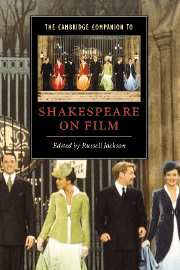Book contents
- Frontmatter
- Introduction
- PART 1 ADAPTATION AND ITS CONTEXTS
- PART 2 GENRES AND PLAYS
- 5 The comedies on film
- 6 Filming Shakespeare's history: three films of Richard III
- 7 Hamlet, Macbeth and King Lear on film
- 8 The tragedies of love on film
- PART 3 DIRECTORS
- PART 4 CRITICAL ISSUES
- Further reading
- Filmography
- Index
5 - The comedies on film
from PART 2 - GENRES AND PLAYS
Published online by Cambridge University Press: 28 May 2006
- Frontmatter
- Introduction
- PART 1 ADAPTATION AND ITS CONTEXTS
- PART 2 GENRES AND PLAYS
- 5 The comedies on film
- 6 Filming Shakespeare's history: three films of Richard III
- 7 Hamlet, Macbeth and King Lear on film
- 8 The tragedies of love on film
- PART 3 DIRECTORS
- PART 4 CRITICAL ISSUES
- Further reading
- Filmography
- Index
Summary
Compared with screen versions of the tragedies and histories, there have been few distinguished films made of the comedies. Max Reinhardt's A Midsummer Night's Dream (1935) may be the only film in this genre to be acclaimed for its pioneering cinematography, and Franco Zeffirelli's The Taming of the Shrew (1966) and Kenneth Branagh's Much Ado About Nothing (1993) are the only two to have achieved popular (if not necessarily critical) success - the former for its use of star actors, Richard Burton and Elizabeth Taylor, who were the cosupremes of their age, and the latter for cameo performances by photogenic stars, high spirits and picturesque settings. Shakespeare's comedies create relationships with their theatre audiences for which very few directors have managed to find cinematic equivalents, and it is not surprising that some of the comedies (The Comedy of Errors, The Merry Wives of Windsor, Two Gentlemen of Verona) have not been filmed in sound and in English for the cinema (although a couple have been the basis of adaptations). The problem plays or 'dark comedies' have not been filmed for the cinema: presumably their sexual politics and toughness of analysis have never been thought likely to appeal to mass audiences, while The Taming of the Shrew, open as it is to both the idealisation and subjugation of women, has received a lot of attention, including versions from D.W. Griffith in 1908, Edward J. Collins in 1923, Sam Taylor in 1929, Paul Nickell in 1950 for American television, Franco Zeffirelli in 1966 - who placed it in the Hollywood genre of the battle-of-the-sexes movie - and, in a considered againstthe- grain version for the BBC and Time-Life Shakespeare series, from Jonathan Miller in 1980.
- Type
- Chapter
- Information
- The Cambridge Companion to Shakespeare on Film , pp. 85 - 98Publisher: Cambridge University PressPrint publication year: 2000
- 3
- Cited by



